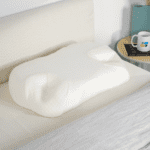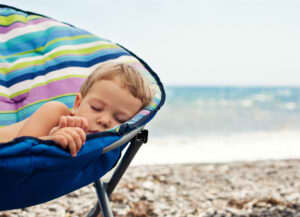Having a consistent sleep routine is critical to ensuring kids get the sleep they need. During the summer, not having school every day can bring major changes to the day-to-day schedules of children and teens. Taking practical steps to help kids develop a summer sleep routine can allow them to enjoy their time off from school while also getting the sleep they need to support their health and well-being.
How to Create a Summer Sleep Routine for Your Children
While strict bedtimes often support a consistent sleep schedule during the school year, many children stay up later and get less sleep during the summer. Focusing on healthy sleep habits even when school is out can help kids get quality sleep year-round.
It’s important to know how much sleep children need. Sleep experts recommend a total amount of sleep for children and teens based on their age.
- Ages 1-2: 11-14 hours (including naps)
- Ages 3-5: 10-13 hours (including naps)
- Ages 6-12: 9-12 hours
- Ages 13-18: 8-10 hours
With these sleep goals in mind, there are several practical steps that can promote habits and routines that make it easier for kids to get a sufficient amount of high-quality sleep.
Maintain a Consistent Sleep Schedule
Kids benefit from a consistent sleep schedule. Even with more light in the evening and no school obligations in the morning, parents should try to set consistent sleep schedules for their kids to maintain similar sleep and wake times during the summer.
This doesn’t mean that there’s no flexibility to adjust your child’s sleep schedule during the summer. Try to keep any bedtime or wake-up time changes to an hour or less to minimize disruptions to sleep patterns.
Continue Typical Bedtime Routines
If you have a bedtime routine during the school year, such as reading a book or giving your child a bath before bed, try to stick to that routine in the summer as well. The consistency of a familiar pre-bed routine may make it easier for them to fall asleep quickly and wake up feeling refreshed.
Stay on Schedule on Vacation
Summer vacations don’t have to cause a huge disruption to your child’s sleep. If you’re taking a trip closer to home, try to keep your typical meal times and have your child go to bed close to their normal bedtime.
If you’re traveling further away and across multiple time zones, you may need to take some extra steps to prevent sleep problems. When flying across three or more time zones, gradually shifting your daily schedule in advance can help reduce jet lag. Getting plenty of natural light exposure after a long-haul flight can also help you and your child more quickly acclimate your sleep and wake patterns to match the local time at your destination.
Limit Electronic Devices
Kids tend to spend more time using electronic devices during the summer, and this can have a significant negative impact on their sleep. Setting limits for screen time may help.
Turn off devices an hour before bedtime to reduce the impact of screen time on sleep. TVs, mobile phones, video game consoles, and computers should be kept out of the bedroom since the bright light they emit may interfere with normal sleep patterns.
Make Time for Physical Activity During the Day
Some kids have an easier time falling asleep when they’re physically active during the day. Aim for your child to spend at least 60 minutes each day doing something physically active. Fun activities, such as swimming, biking, and going for walks are great ways to keep your child active during the summer.
Ensure a Comfortable Sleep Environment
Make sure your child’s bedroom is conducive for sleep. Summer nights may be hotter and brighter, but there are steps you can take to keep their room cool, dark and quiet.
Blackout curtains work to block out light from the outside, and a white noise machine can help drown out distracting noises. A fan or air conditioning may help achieve a comfortable bedroom temperature, which for many people is about 65 to 68 degrees. You can also switch to lighter and more breathable bedding during the summer to help your child sleep cool.
Shop the Best Mattresses for KidsBe a Role Model
One of the best ways you can encourage good sleep habits in your child is to provide an example of those habits yourself. A recent survey found that many adults sleep less in the summer, and if you’re not prioritizing sleep in the summer, your child may not either. Most aspects of sleep hygiene can enhance the sleep of people at any age, so building better habits and routines can be beneficial for the entire family.
References
Ask the Sleep Doctor
Have questions about sleep? Submit them here! We use your questions to help us decide topics for articles, videos, and newsletters. We try to answer as many questions as possible. You can also send us an email. Please note, we cannot provide specific medical advice, and always recommend you contact your doctor for any medical matters.



































